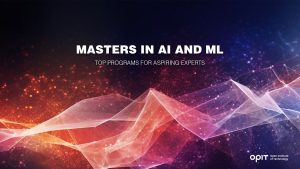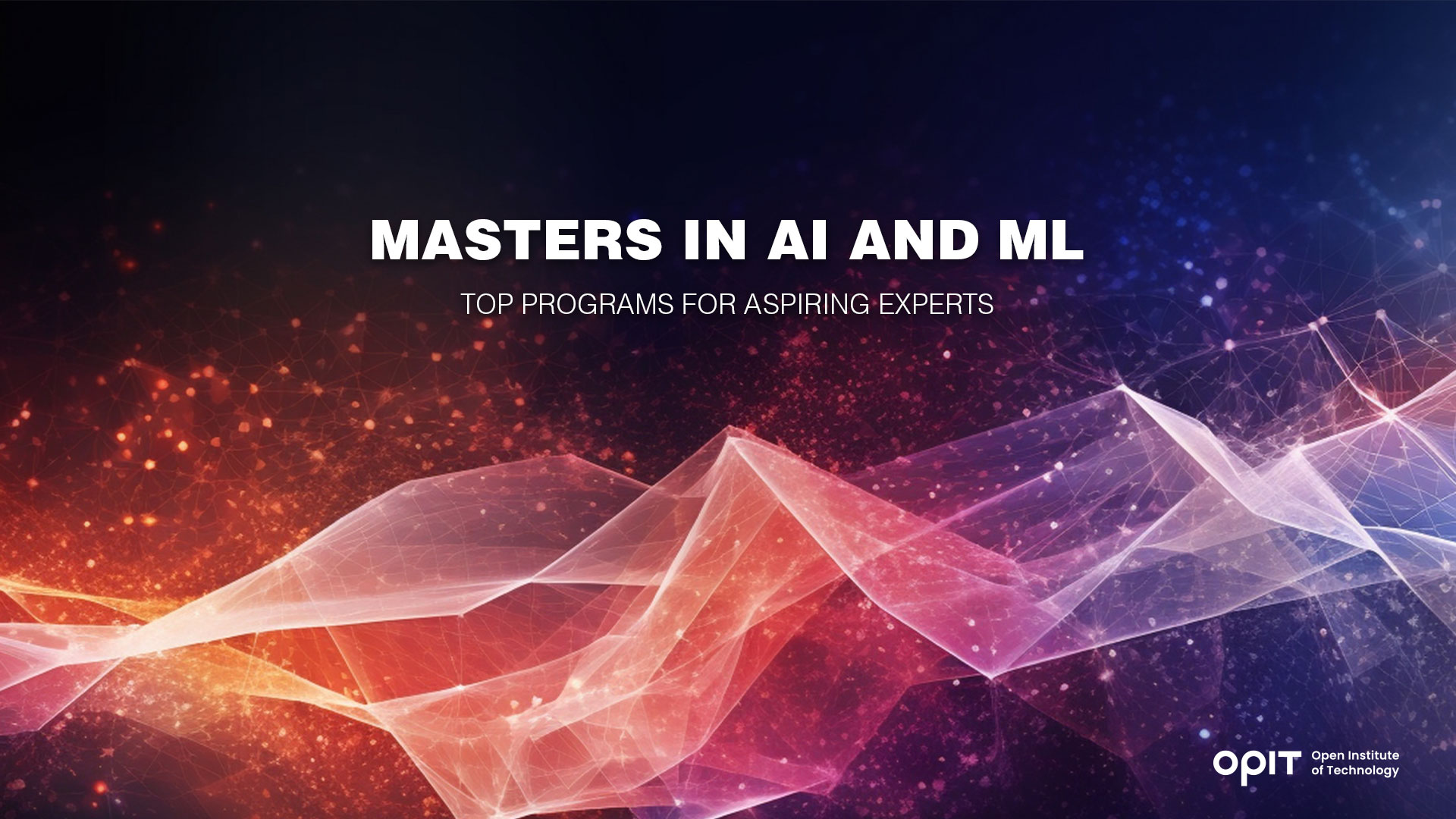Few computer science concepts have been as popular as artificial intelligence and machine learning. Traditionally reserved for sci-fi and fantasy, these disciplines have entered the real world and been eagerly welcomed by the public. Of course, tech companies and businesses across all industries were also quick to reap the benefits of AI and ML.
Today, the job market is full of offers for experts in the two fields. More importantly, plenty of those job listings come from leading companies, representing prime career opportunities. But tech giants want genuine experts – people thoroughly educated in the field.
Getting an MSc in AI and machine learning is an excellent way to gain the knowledge, experience, and proper credentials to land some of the most profitable and exciting jobs in the industry. The possibilities here are almost unlimited: You can enroll at a university for live classes or obtain your master’s degree in AI and machine learning online.
We’ve compiled a list of the best programs to get your masters in AI and ML. Let’s look at what the top educational institutions have to offer.
Factors to Consider when Choosing a Masters Program in AI and ML
Picking the best masters in machine learning and artificial intelligence isn’t a straightforward choice. Many institutions offer courses on the subject, but not all of them are of equal quality. Here are the essential criteria to consider when deciding which course to take:
- University reputation and ranking: The first factor to look at is whether the university is well-regarded among current and former students, as well as internationally. A reputable institution will usually meet other quality criteria as well.
- Curriculum and course offerings: Every masters in AI and ML program will be slightly different. You should examine the curriculum closely to find out if the classes match your educational and professional goals.
- Research opportunities and faculty expertise: There’s plenty of theory in AI and ML, but the core value of these disciplines lies in practical application. That’s why you’ll want to pick a program with ample research and hands-on opportunities. On a similar note, the faculty members should be industry experts who can explain and show real-life uses of the skills taught.
- Job placement and industry connections: Besides the knowledge, top MSc in AI and machine learning programs will provide access to industry networks and the relevant job market. This will be one of the greatest advantages of enrollment. You’ll get the chance to enter the AI and MS professional landscape upon graduation or, in some cases, during the program.
- Tuition fees and financial aid: Studying at top universities can be costly and may impact your budget severely. However, that doesn’t mean you can’t get quality education without breaking the bank. You can find reasonably priced offers or financial aid methods to help you along the way.
Top 5 Masters Programs in AI and ML
1. Imperial College London – MSc in Artificial Intelligence
The Imperial College in London offers intensive AI and programming training in this MSc program. During your studies, you’ll gain the essential and advanced technical skills, as well as experience in practical AI application.
This program lasts for one year and includes full-time studying on site in South Kensington. The total fee, expressed in British Pounds, is £21,000 for UK students and £39,400 for learners from abroad. To enroll, you’ll need to meet the minimum requirements of a degree in engineering, physics, mathematics, or similar fields.
In terms of the curriculum, this program’s core modules include Introduction to Machine Learning, Introduction to Symbolic Artificial Intelligence, and Python Programming. You’ll participate in individual and group projects and have access to state-of-the-art computing labs.
Certain projects are done in collaboration with leading AI companies, representing an excellent opportunity to get in touch with acclaimed tech professionals. As a result, graduates from this program have improved chances of finding high-level work in the industry.
2. University of Tuebingen – International Master’s Program in Machine Learning
The master’s in machine learning from the University of Tuebingen is a flexible program with particular emphasis on statistical ML and deep learning. The institution ensures the lectures follow the latest trends in the ever-developing machine learning field.
You can finish the studies during the four semesters of the program or take an extra semester. In that case, you’ll be eligible for a note of distinction, depending on the quality of your thesis. Non-EU students will need to pay a fee of €1,500 per semester along with a €160 semester fee. Students from the EU and others eligible for fee exceptions will only have to cover the semester fees.
As mentioned, the curriculum is exceptionally flexible. The program features only three mandatory lectures: Probabilistic Inference and Learning, Statistical Machine Learning, and Deep Learning. All other lectures are elective, so you can tailor the program to fit your needs and goals precisely.
The lecturers at Tuebingen University, all renowned machine learning researchers, will work with you actively during the program. Owing to the institution’s interdisciplinary approach, you’ll be able to work on your thesis under the supervision of any computer science professor, regardless of their particular field of expertise.
As a partner of the Max Planck Institute, this university regularly collaborates with world-class tech professionals and innovators. And as a student of the University of Tuebingen, you’ll have the chance to meet and work with those authorities. You can even write your thesis during an apprenticeship with a leading tech company.
Check out OPIT degrees
-
Career aligned
-
Fully Online
-
EU-accredited institution
3. University of Amsterdam – Master in Artificial Intelligence
The artificial intelligence MSc at the University of Amsterdam is among the most comprehensive programs worldwide. It’s designed to provide students with a broad scope of knowledge about AI and its practical application.
This is a full-time, regular program that lasts for two years and takes place in the university’s Science Park. The tuition fee for Dutch, Swiss, Surinamese, or EU students is €2,314, while other learners will need to pay €16,500. It’s worth mentioning that scholarships are available for all students.
For the first year, the curriculum includes seven core courses meant to establish a strong foundation in machine learning, computer vision, and NLP. The second year consists entirely of electives, both restricted and free-choice. Of course, you’ll wrap up the program with an AI thesis.
This artificial intelligence MSc program offers excellent career prospects. Many alumni have found work in distinguished positions at leading tech or tech-adjacent companies like Google, Eagle Vision, Airbnb, and Volvo.
4. Johns Hopkins University – Artificial Intelligence Master’s Program Online
As one of the leading educational centers in the world, Johns Hopkins University provides exceptional programs and courses in numerous areas. This online AI master’s program is no different. It will give you a solid understanding of the subject in theory and practice.
To earn this degree, you’ll need to pass 10 courses in the total period of five years. Since Johns Hopkins is a U.S. university, the tuition fees are expressed in dollars. The standard fee per course is $6,290. However, this program is a part of the university’s Engineering for Professionals division, and all courses in that division are subject to a special dean’s discount. The actual price you’ll pay, therefore, will be $5,090 per course or $50,900 in total.
The core courses you’ll take will include Introduction to Algorithms or Algorithms for Data Science, Applied Machine Learning, Artificial Intelligence, and Creating AI-Enabled Systems. The rest of the curriculum will consist of six electives – you’ll have 26 to choose from.
The faculty consists of acclaimed experts, and the university has close ties with industry-leading companies. Both of which will help you build your network and connect with professionals who may help advance your career.
5. KTH Sweden – MSc Machine Learning
Housed at the university’s campus in Stockholm, this MSc in machine learning program is a part of the KTHs School of Electrical Engineering and Computer Science. The program examines different facets of machine learning and how they apply to problem-solving in the real world.
The program is broken down into four semesters and lasts for two years total, if completed regularly. Swiss and EU students need not pay fees for program application or tuition. For other learners, the tuition fee for the whole program will be SEK 310,000, while the application fee is SEK 900.
The curriculum consists of mandatory and elective classes, with the electives being conditioned. For example, you’ll need to choose a minimum of six courses from the two groups of Theory and Application Domain.
KTH has an impressive percentage of graduates who found employment – 97%. Of those, half have assumed leadership positions, and one in 10 works in a managerial role. In fact, more than half of KHTs students start working in their respective industries before getting the degree. This serves as proof of the stellar reputation that KHT enjoys nation- and worldwide.
Become an Expert in the Leading Computer Science Disciplines
Getting a masters in AI and ML can help you find your place in these highly competitive industries. Of course, it will be necessary to find a program that suits you to maximize your chances of success.
Whichever program you choose, one thing is certain: Machine learning and artificial intelligence will continue to grow in importance. With a proper education, you’ll be able to keep up the pace and may find yourself among the experts leading the progress in these disciplines.
Check out OPIT degrees
-
Career aligned
-
Fully Online
-
EU-accredited institution






